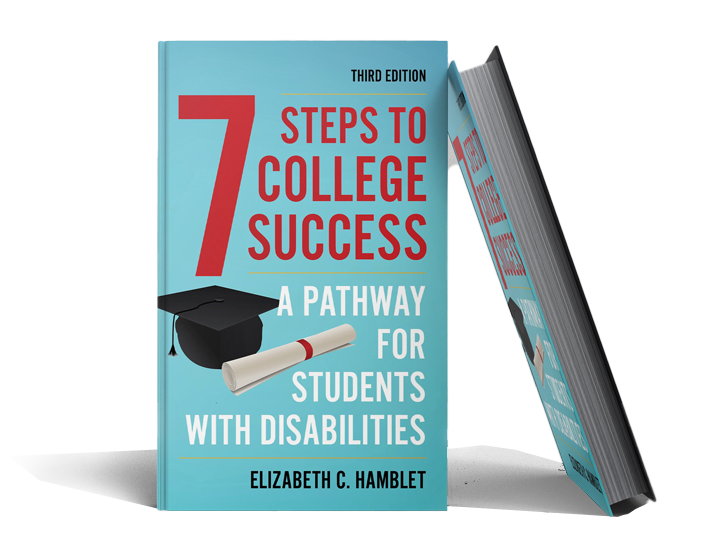Introduction
A parent asked this question in my Facebook group.
As always, nothing I say here is legal or medical advice. (Please consult a qualified professional if you need one.) But I’ve been in the field 25 years, I’m active in my professional community, and when I wrote my books, colleagues confirmed what I’ll share here.
What are course substitutions, and why would students need them?
For those who haven’t attended college themselves, had a student in college yet, or who attended college outside of the United States, be aware that many (but not all) colleges require students to meet two different sets of requirements in order to graduate.
One set encompasses the college’s “general education” or “core” requirements that everyone earning a degree there has to take.
The other set covers the requirements for their major.
What do the laws say?
The parent who asked the question referenced Section 504 of the Rehabilitation Act of 1973, which is a civil rights law. The other relevant law is the Americans with Disabilities Act (ADA). Most of the guidance for colleges comes from Section 504, which was written about 16 years before the ADA. (Learn much more about the laws in Step 1 of my book.) Section 504 says colleges may make substitutions, but it doesn’t mandate that they do. What do I mean?
Colleges are allowed to decide on their essential requirements, and they don’t have to provide substitutions even when a student’s disability makes it very challenging or impossible for them to pass a class. Any college should already have gone through a thorough process involving various members of the faculty and administration to determine why these requirements are essential. If they’ve done this, and a student rejected for a substitution files a complaint with the Office for Civil Rights (OCR), OCR would likely ask about such a process.
It is my opinion (based on discussions that I’ve seen in my professional community) that OCR would not require that college to approve the substitution. The sense I get from comments in my online community of professionals (and from OCR decision letters) is that they are focused on the process colleges go through to make a decision but they typically defer to colleges on academic decisions.
Lawsuits aren’t common in my field, but one significant one was a class action against Boston University (BU) in the mid-90s. Foreign language substitutions were an issue in that suit; some students with disabilities thought the college should have to approve them for eligible students. My understanding (again, not legal or medical advice) is that when BU first explained why they thought they shouldn’t have to provide substitutions to the court, the court found BU hadn’t gone through an appropriate process to arrive at their decision. BU then went through a proper process (I don’t know what that looked like), resubmitted, and that decision was allowed to stand.
[Current BU students planning to ask for a substitution or those considering applying or who have applied to BU shouldn’t panic. This decision was made almost 30 years ago and it means they don’t have to make substitutions, but BU may have changed its policy since then. Concerned students should ask.]
Who decides whether students will be approved for substitutions?
You may be surprised to learn that neither Section 504 nor the ADA lays out a process for colleges to follow when considering substitutions, even though Section 504 says substitutions may be considered. As a result, colleges can make their own decisions about this, and processes vary from college to college.
In each of my previous work experiences at two different universities, the disability services (DS) office’s job was to review students’ requests and documentation and provide an opinion as to whether a substitution would be appropriate for each one, given what their documentation showed. But DS wasn’t the one to make the decision about this. I presume the results of these reviews were passed on to whoever made the decisions, whether it was an individual or a panel. The process is the same at my current university
Do colleges approve course substitutions?
I’ve never seen any studies examine this specific accommodation, so I can’t provide you with any statistics.
In one of my previous jobs, a number of Psychology majors couldn’t pass Statistics and asked for a substitution for that course. But I believe Statistics is a typical requirement for Psychology majors. And as I’ve said, it wasn’t DS’s decision to make, even if we thought a substitution was appropriate.
In working with students over my time in the field, I’ve met some who were approved for a substitution, but not everyone I’ve seen ask for a substitution has been approved for one. Colleges may require quite a severe weakness in the relevant skill areas to find a student eligible.
Why do you say “substitution” instead of “waiver?” Don’t they mean the same thing?
To many people working at the college level, the word “waiver” implies the college would tell a student they didn’t have to take a required course and didn’t have to take any other course to help fill that requirement, meaning they wouldn’t have to make up the missing credits they would have earned.
The word “substitution” helps to convey what typically happens – students who get approved have to take a different course that helps meet the requirement for the student’s major or the school’s core requirements, earning the credits that they would have otherwise earned with the challenging class.
Again, I don’t have any statistics to share, but I’d be surprised if a lot of colleges provide students with a waiver rather than a substitution.
My advice for high school students looking at colleges
I recommend that students with disabilities who are composing a college list:
- check graduation requirements at all the colleges on their list. Maybe some schools won’t require classes they’ll find really challenging.
- ask the DS office at the colleges on their list whether they have seen the school make course substitutions for the school’s core requirements. (Don’t ask Admissions! It’s unlikely they know about this and they may give the wrong answer.) DS typically won’t be able to tell students applying to the school whether they will get a substitution, but they can certainly ask whether this could be reviewed. (Most colleges don’t have the staffing for this but it never hurts to ask.)
In case someone has told you something about this, don’t worry that contacting DS will ruin students’ chances at admission.
Advice for students once they enroll
I recommend students:
- register with DS immediately and ask for the substitution they think they need
- check the requirements of any major they want to choose. No one can tell them not to choose a major (that would be discriminatory). But that also means they should feel confident about their ability to pass the required classes
Get more information about course requirements and substitutions
You may also want to read these posts on my blog:
– Advice on Math and Foreign Language Requirements for College Students with Disabilities
– College Admissions and Graduation Requirements: What Students with Disabilities Should Know
– Strategies to Fulfill Challenging College Requirements




